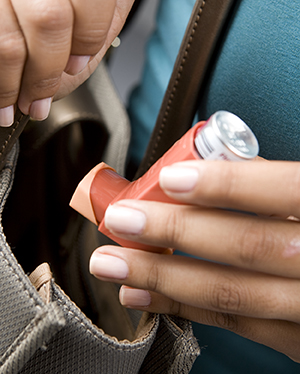Your Child's Asthma: Staying Away from Triggers
Triggers are things that make your child’s asthma worse. Helping your child stay away from triggers helps control their asthma. Thinking about the things you need to do to help your child stay away from triggers can be overwhelming. Start by working to control the ones that affect your child the most.
Irritants and other common triggers
Irritants affect all people with asthma.
Smoke is an irritant that can trigger asthma. To protect your child:
-
If you smoke, quit. This may be the single best thing you can do to help control your child’s asthma. Ask your healthcare provider for help in quitting. Contact the American Lung Association at http://www.lung.org to learn about stop-smoking programs and support groups.
-
Encourage any smokers who are members of your household to quit.
-
Keep your home and car free of tobacco smoke, incense, and smoke from fireplaces. Don't use e-cigarettes or vaping devices around your child.
-
Keep your child out of smoky places.
A cold or the flu can trigger asthma symptoms. To stay away from cold and flu germs:

Scents and chemicals can trigger asthma. To reduce these triggers:
-
Use pump sprays instead of aerosols.
-
Switch to unscented soap, lotion, toilet paper, and cleaning products.
-
Don’t use air fresheners or perfume.
-
If you have a gas stove, use the exhaust fan when the stove is on. Make sure pilot lights are adjusted correctly. (Your utility company can help with this.)
Some types of weather can trigger asthma. Wind spreads pollen. Heat traps air pollution. Cold air can be a trigger all by itself. The best way to prevent weather from triggering asthma is to make sure your child takes their long-term controller medicine. If cold air is a trigger, wearing a scarf over the nose and mouth when outside on cold days may help.
Allergy triggers
In children with asthma, allergies can trigger flare-ups. The following are some common allergens.
Dust mites are tiny bugs that live in house dust. Dust mites do not bite, but they can cause allergies. Cleaning or removing things that trap dust helps to control them. Start with your child’s bedroom:
-
Wash all bedding and stuffed animals weekly in hot water at 130°F (54.4°C).
-
Vacuum every week. Using a vacuum with a HEPA (high efficiency particulate air) filter is best.
-
Put allergen-proof covers over pillows and mattresses.
Furry or feathered animals are common sources of allergens. If your child is allergic, keep these animals away from your child. If you have a furry or feathered pet, try the following:
-
Keep the pet out of your child's bedroom. Bathe the pet weekly if possible.
-
Be sure that your child has no down (feather) pillows or bedding.
-
You may have to find the pet a new home. This can be sad, but it is the best option for your child’s health.
Mold thrives in damp places. To reduce mold:
Pollen from grasses, trees, and weeds can cause allergies.
-
If you have an air conditioner, use it during seasons when a lot of pollen is in the air. Change or clean the filters regularly. This lets you keep windows closed, so less pollen gets in.
-
Make sure your child bathes and changes clothes after playing outside.
Online Medical Reviewer:
Amy Finke RN BSN
Online Medical Reviewer:
Dan Brennan MD
Online Medical Reviewer:
Rita Sather RN
Date Last Reviewed:
10/1/2024
© 2000-2025 The StayWell Company, LLC. All rights reserved. This information is not intended as a substitute for professional medical care. Always follow your healthcare professional's instructions.